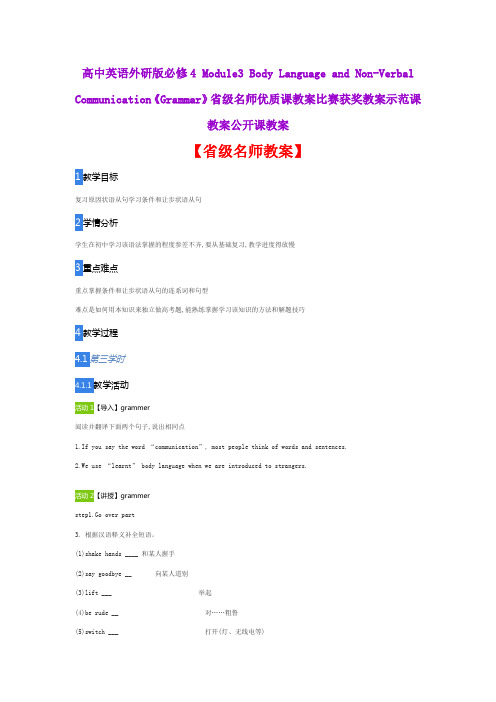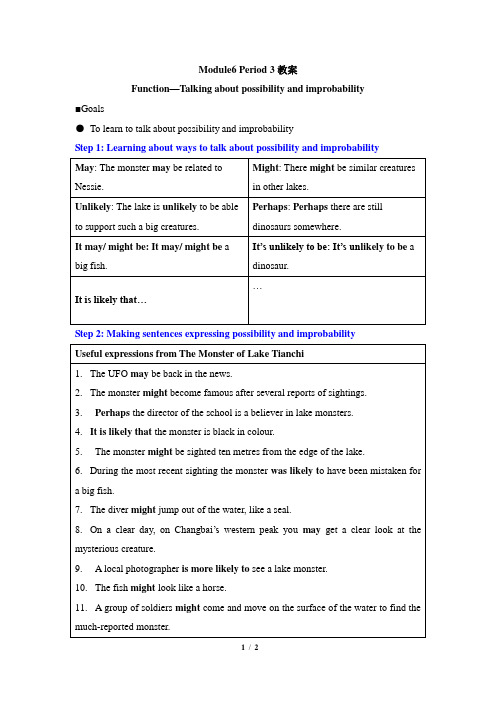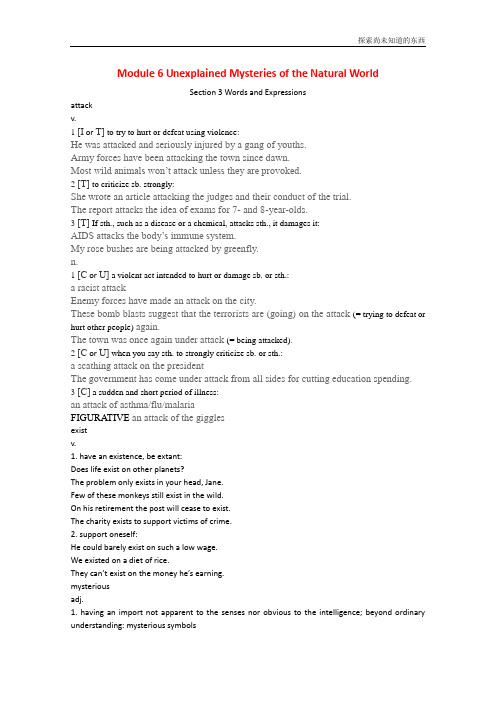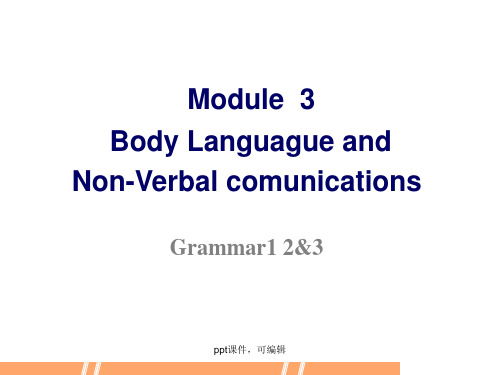外研必修四第三模块语法教案6
- 格式:doc
- 大小:30.50 KB
- 文档页数:6

高中英语外研版必修4Module3 Body Language and Non-Verbal Communication《Grammar》省级名师优质课教案比赛获奖教案示范课
教案公开课教案
【省级名师教案】
1教学目标
复习原因状语从句学习条件和让步状语从句
2学情分析
学生在初中学习该语法掌握的程度参差不齐,要从基础复习,教学进度得放慢
3重点难点
重点掌握条件和让步状语从句的连系词和句型
难点是如何用本知识来独立做高考题,能熟练掌握学习该知识的方法和解题技巧
4教学过程
4.1第三学时
教学活动
1【导入】grammer
阅读并翻译下面两个句子,说出相同点
1.If you say the word “communication”, most people think of words and sentences.
2.We use “learnt” body language when we are introduced to strangers.
2【讲授】grammer
step1.Go over part
3. 根据汉语释义补全短语。
(1)shake hands ____ 和某人握手
(2)say goodbye __ 向某人道别
(3)lift ___ 举起
(4)be rude __ 对……粗鲁
(5)switch ___ 打开(灯、无线电等)。


Module 6 Unexplained Mysteries of the Natural WorldSection 3 Words and Expressionsattackv.1[I or T]to try to hurt or defeat using violence:He was attacked and seriously injured by a gang of youths.Army forces have been attacking the town since dawn.Most wild animals won’t attack unless they are provoked.2[T]to criticize sb. strongly:She wrote an article attacking the judges and their conduct of the trial.The report attacks the idea of exams for 7- and 8-year-olds.3[T]If sth., such as a disease or a chemical, attacks sth., it damages it:AIDS attacks the body’s immune system.My rose bushes are being attacked by greenfly.n.1[C or U]a violent act intended to hurt or damage sb. or sth.:a racist attackEnemy forces have made an attack on the city.These bomb blasts suggest that the terrorists are (going) on the attack (= trying to defeat or hurt other people) again.The town was once again under attack (= being attacked).2[C or U]when you say sth. to strongly criticize sb. or sth.:a scathing attack on the presidentThe government has come under attack from all sides for cutting education spending.3[C]a sudden and short period of illness:an attack of asthma/flu/malariaFIGURATIVE an attack of the gigglesexistv.1. have an existence, be extant:Does life exist on other planets?The problem only exists in your head, Jane.Few of these monkeys still exist in the wild.On his retirement the post will cease to exist.The charity exists to support victims of crime.2. support oneself:He could barely exist on such a low wage.We existed on a diet of rice.They can’t exist on the money he’s earning.mysteriousadj.1. having an import not apparent to the senses nor obvious to the intelligence; beyond ordinary understanding: mysterious symbols2. of an obscure nature:The new insurance policy is written without cryptic or mysterious terms.He died in mysterious circumstances, and there is still a possibility that it was murder. claimv.1to say that sth. is true or is a fact, although you cannot prove it and other people might not believe it:[+ (that)] The company claims (that) it is not responsible for the pollution in the river. [+ to infinitive] He claims to have met the President, but I don't believe him.All parties have claimed success in yesterday's elections.An unknown terrorist group has claimed responsibility for this morning's bomb attack. 2If an organization or group claims a particular number of members, that number of people are believed to belong to it.divev.1to jump into water, especially with your head and arms going in first, or to move down under the water:Look at those children diving for oysters over there!They ran to the pool, dived in, and swam to the other side.Mark dived off the bridge into the river.The submarine dived just in time to avoid the enemy attack.See also nosedive.2to swim under water, usually with breathing equipment3to go down very quickly:The plane dived towards the ground and exploded in a ball of flame.The goalkeeper dived for the ball (= tried to catch the ball by jumping towards it and falling on the ground.)coverv.to put or spread sth. over sth., or to lie on the surface of sth.:The light was so bright that I had to cover my eyes.Snow covered the hillsides.She covered him (up) with a blanket.Cover the meat with a layer of cheese.The bandages were covered with/in blood.How much of the Earth’s surface is covered by/with water?This paint covers well.The President covered the fact that he bugged the offices in the White House.Is this enough to cover the check?adaptv. to change sth. to suit different conditions or uses:Many software companies have adapted popular programs to the new operating system. The recipe here is a pork roast adapted from Carolin e O’Neill’s book ‘Louisiana Kitchen’.[+ to infinitive] We had to adapt our plans to fit Jack’s timetable.The play had been adapted for (= changed to make it suitable for) children.Davies is busy adapting Brinkworth’s latest novel for television.disappearvi. If people or things disappear, they go somewhere where they cannot be seen or found:The search was called off for the sailors who disappeared in the storm.This is a way of life that is fast disappearing.I can’t find my keys anywhere –they’ve com pletely disappeared.The sun disappeared behind a cloud.We looked for her but she had disappeared into the crowd.The film is about a girl who mysteriously disappeared while on a picnic at Hanging Rock.I don’t know how it’s possible for a person to disap pear without trace.He disappeared without a trace.extinctadj. not now existing:There is concern that the giant panda will soon become extinct.Many tribes became extinct when they came into contact with Western illnesses.A lot of trades have become extinct because of the development of technology.Threw his extinct cigarette into the stream.evolvev. to develop gradually, or to cause sth. or sb. to develop gradually:Humans evolved from apes.The company has evolved over the years into a multi-million dollar organization. Bacteria are evolving resistance to antibiotics.Modern man evolved a long time ago.fierceadj.1physically violent and frightening:a fierce attack/battleTwo men were shot during fierce fighting last weekend.2strong and powerful:Fierce winds/seas prevented the race from taking place.Fire fighters had to retreat from the fierce heat.3showing strong feeling or energetic activity:The expansion plans will face fierce opposition/resistance from environmentalists. There is fierce competition to join the Special Branch.generousadj. willing to give money, help, kindness, etc., especially more than is usual or expected:a very generous man[+ to infinitive] It was most generous of you to lend me the money.She’s been very generou s with her time.There’s a generous (= kinder than deserved)review of the book in today’s newspaper. reputationn. the opinion that people in general have about sb. or sth., or how much respect or admiration sb. or sth. receives, based on past behavior or character:The company has a worldwide reputation for quality.She has the reputation of being a good doctor.His reputation was destroyed when he was caught stealing some money.The hotel has a bad/good reputation.He earned /established /gained /acquired a reputation as an entertaining speaker.He acquired a reputation as an actor before he started writing.bordern. the line that divides one country from another:Were you stopped at the border?The train crosses the border between France and Spain.The two countries have had frequent border disputes.The rug had a wide blue border.positiveadj.1 certain and without any doubt:Are you positive (that) you saw me switch the iron off?“Are you sure it's okay for me to use your mother’s car?” “Positive.”“It was him - I saw him take it.” “Are you positive about that?”2 hopeful and confident, or giving cause for hope and confidence:a positive attitudeOn a more positive note, we're seeing signs that the housing market is picking up.The past ten years have seen some very positive developments in East-West relations. There was a very positive response to our new design - people seemed very pleased with it.indicatev.1 to show, point or make clear in another way:Exploratory investigations have indicated large amounts of oil below the sea bed.[+ question word] Please indicate which free gift you would like to receive.[+ (that)] She indicated to me (that) she didn’t want me to say anything.2 to suggest sth. as being suitable:SPECIALIZED Antihistamine is indicated for this patient as a treatment for her allergies.HUMOROUS I’m so hot and tired - I think a long cool drink is indicated!identityn. who a person is, or the qualities of a person or group which make them different from others: The man’s ide ntity was being kept secret while he was helping police with enquiries.I cannot reveal the identity of my source.The informant was given a new identity (= a different name and new official documents) for protection.The newspaper photo apparently showed him in Rome but it was a case of mistaken identity (= it was the wrong person).In prison people often suffer from a loss of identity.I think my job gives me a sense of identity.You can lose your identity when you join the army. They shared an identity of interests.。



《Module3 Body language and non-verbal munication》教学设计龙东南联合体第九次教研活动海林市高级中学冷泠一、本节课在教材中的地位与作用本节课选自外研社版高级中学英语教科书必修4,第三模块,《身势语与非言语交际》的Introdution,Listening and Vocabulary 和Everyday English 部分。
本课本模块的第一课时的学习,主要学习内容为:1 引入各身体部位和动作有关的词汇,以及在交际场合人们所用的部分词汇和可能采用的身势语,是本模块要呈现的主要学习内容。
2 与西方人士交往中的礼仪和文化差异,这一部分内容是前一部分内容的升华。
是对更深层次文化内容的探讨。
为实现本模块最终教学目标奠定了坚实的基础。
二、课标要求听:能从识别对话和语段中正确理解新词汇和短语的意思。
能听懂有关熟悉话题的讨论和谈话并抓住要点。
说:能在日常交际中对一般的询问和要求做出恰当的反应。
能根据话题要求与人交流、合作,共同完成任务。
三、学情分析(一)知识方面1、已有的知识和能力:了解一些身势语,词汇量不够不能有效地表达,对东西方文化差异的知识知道得不多,所学相关词汇没有形成有效的知识络。
2、听说中存在的主要问题:听:(1)原有的听力习惯:在篇幅和语句较长的时候,一旦有听不懂的词汇或句子,就失去了信心。
(2)受母语的干扰。
(3)高一学生词汇量不足。
(二)学习方法学习策略如:认识策略,信息策略等亟待正确指导。
四、教材的加工处理依据教材分析,《新课标》要求及学情分析,对教材做如下加工处理:(1)调整顺序(将Everyday English前置)Everyday English中所涉及的短语和句型,都是听说中的关键词,提前让学生掌握,可以降低难度,保证质量。
(2)调整听力内容,渗透相关学习策略对本节课听力内容中较难把握的部分,为了降低难度,教师将听力材料分段处理,分别播放,要求重点掌握的单词和短语以填空形式重新呈现。
Module 6 Unexplained Mysteries of the Natural WorldSection 3 Words and Expressionsattackv.1[I or T]to try to hurt or defeat using violence:He was attacked and seriously injured by a gang of youths.Army forces have been attacking the town since dawn.Most wild animals won’t attack unless they are provoked.2[T]to criticize sb. strongly:She wrote an article attacking the judges and their conduct of the trial.The report attacks the idea of exams for 7- and 8-year-olds.3[T]If sth., such as a disease or a chemical, attacks sth., it damages it:AIDS attacks the body’s immune system.My rose bushes are being attacked by greenfly.n.1[C or U]a violent act intended to hurt or damage sb. or sth.:a racist attackEnemy forces have made an attack on the city.These bomb blasts suggest that the terrorists are (going) on the attack (= trying to defeat or hurt other people) again.The town was once again under attack (= being attacked).2[C or U]when you say sth. to strongly criticize sb. or sth.:a scathing attack on the presidentThe government has come under attack from all sides for cutting education spending.3[C]a sudden and short period of illness:an attack of asthma/flu/malariaFIGURATIVE an attack of the gigglesexistv.1. have an existence, be extant:Does life exist on other planets?The problem only exists in your head, Jane.Few of these monkeys still exist in the wild.On his retirement the post will cease to exist.The charity exists to support victims of crime.2. support oneself:He could barely exist on such a low wage.We existed on a diet of rice.They can’t exist on the money he’s earning.mysteriousadj.1. having an import not apparent to the senses nor obvious to the intelligence; beyond ordinary understanding: mysterious symbols2. of an obscure nature:The new insurance policy is written without cryptic or mysterious terms.He died in mysterious circumstances, and there is still a possibility that it was murder. claimv.1to say that sth. is true or is a fact, although you cannot prove it and other people might not believe it:[+ (that)] The company claims (that) it is not responsible for the pollution in the river. [+ to infinitive] He claims to have met the President, but I don't believe him.All parties have claimed success in yesterday's elections.An unknown terrorist group has claimed responsibility for this morning's bomb attack. 2If an organization or group claims a particular number of members, that number of people are believed to belong to it.divev.1to jump into water, especially with your head and arms going in first, or to move down under the water:Look at those children diving for oysters over there!They ran to the pool, dived in, and swam to the other side.Mark dived off the bridge into the river.The submarine dived just in time to avoid the enemy attack.See also nosedive.2to swim under water, usually with breathing equipment3to go down very quickly:The plane dived towards the ground and exploded in a ball of flame.The goalkeeper dived for the ball (= tried to catch the ball by jumping towards it and falling on the ground.)coverv.to put or spread sth. over sth., or to lie on the surface of sth.:The light was so bright that I had to cover my eyes.Snow covered the hillsides.She covered him (up) with a blanket.Cover the meat with a layer of cheese.The bandages were covered with/in blood.How much of the Earth’s surface is covered by/with water?This paint covers well.The President covered the fact that he bugged the offices in the White House.Is this enough to cover the check?adaptv. to change sth. to suit different conditions or uses:Many software companies have adapted popular programs to the new operating system. The recipe here is a pork roast adapted from Carolin e O’Neill’s book ‘Louisiana Kitchen’.[+ to infinitive] We had to adapt our plans to fit Jack’s timetable.The play had been adapted for (= changed to make it suitable for) children.Davies is busy adapting Brinkworth’s latest novel for television.disappearvi. If people or things disappear, they go somewhere where they cannot be seen or found:The search was called off for the sailors who disappeared in the storm.This is a way of life that is fast disappearing.I can’t find my keys anywhere –they’ve com pletely disappeared.The sun disappeared behind a cloud.We looked for her but she had disappeared into the crowd.The film is about a girl who mysteriously disappeared while on a picnic at Hanging Rock.I don’t know how it’s possible for a person to disap pear without trace.He disappeared without a trace.extinctadj. not now existing:There is concern that the giant panda will soon become extinct.Many tribes became extinct when they came into contact with Western illnesses.A lot of trades have become extinct because of the development of technology.Threw his extinct cigarette into the stream.evolvev. to develop gradually, or to cause sth. or sb. to develop gradually:Humans evolved from apes.The company has evolved over the years into a multi-million dollar organization. Bacteria are evolving resistance to antibiotics.Modern man evolved a long time ago.fierceadj.1physically violent and frightening:a fierce attack/battleTwo men were shot during fierce fighting last weekend.2strong and powerful:Fierce winds/seas prevented the race from taking place.Fire fighters had to retreat from the fierce heat.3showing strong feeling or energetic activity:The expansion plans will face fierce opposition/resistance from environmentalists. There is fierce competition to join the Special Branch.generousadj. willing to give money, help, kindness, etc., especially more than is usual or expected:a very generous man[+ to infinitive] It was most generous of you to lend me the money.She’s been very generou s with her time.There’s a generous (= kinder than deserved)review of the book in today’s newspaper. reputationn. the opinion that people in general have about sb. or sth., or how much respect or admiration sb. or sth. receives, based on past behavior or character:The company has a worldwide reputation for quality.She has the reputation of being a good doctor.His reputation was destroyed when he was caught stealing some money.The hotel has a bad/good reputation.He earned /established /gained /acquired a reputation as an entertaining speaker.He acquired a reputation as an actor before he started writing.bordern. the line that divides one country from another:Were you stopped at the border?The train crosses the border between France and Spain.The two countries have had frequent border disputes.The rug had a wide blue border.positiveadj.1 certain and without any doubt:Are you positive (that) you saw me switch the iron off?“Are you sure it's okay for me to use your mother’s car?” “Positive.”“It was him - I saw him take it.” “Are you positive about that?”2 hopeful and confident, or giving cause for hope and confidence:a positive attitudeOn a more positive note, we're seeing signs that the housing market is picking up.The past ten years have seen some very positive developments in East-West relations. There was a very positive response to our new design - people seemed very pleased with it.indicatev.1 to show, point or make clear in another way:Exploratory investigations have indicated large amounts of oil below the sea bed.[+ question word] Please indicate which free gift you would like to receive.[+ (that)] She indicated to me (that) she didn’t want me to say anything.2 to suggest sth. as being suitable:SPECIALIZED Antihistamine is indicated for this patient as a treatment for her allergies.HUMOROUS I’m so hot and tired - I think a long cool drink is indicated!identityn. who a person is, or the qualities of a person or group which make them different from others: The man’s ide ntity was being kept secret while he was helping police with enquiries.I cannot reveal the identity of my source.The informant was given a new identity (= a different name and new official documents) for protection.The newspaper photo apparently showed him in Rome but it was a case of mistaken identity (= it was the wrong person).In prison people often suffer from a loss of identity.I think my job gives me a sense of identity.You can lose your identity when you join the army. They shared an identity of interests.。
三:语法
语法:本单元的语法项目为条件状语从句和让步状语从句。
1.条件状语从句(adverbial clause of condition)
条件状语从句由从属连词: if, unless, suppose, as/so long as, on condition that 等引导。
e.g.
You can’t learn a language well unless you work har d. 除非你努力学习,否则是学不好语言的。
We should serve the people as (so) long as we live.只要我们活着,就应为人民服务。
在条件状语从句中,通常不用一般将来时,而用一般现在时来代替。
We’ll come over to see you on Wednesday if we have time.如果有空,我们星期三来看你。
He will not leave unless it is fine tomorrow.除非明天天晴,否则他不走。
(1). if引导的条件状语从句
if 引导的条件句有真实条件句和非真实条件句两种。
非真实条件句以后在虚拟语气中阐述,在此仅举数例说明。
① 与现在事实相反
e.g.
If I were not so busy, I would go for an outing tod ay.
如果今天不是那么忙,我就出去玩了。
(事实上:I’m busy,
I can’t go for an outing today.)
② 与过去事实相反
e.g.
If you had been here yesterday, you would have hear d a very good talk.
如果你昨天在这里,你就会听到一个十分精彩的报告。
(事实上:You were not here yesterday, so you didn’t he ar a very good talk.)
③ 与将来事实相反
e.g.
If any one should call, please let me know.
万一有人打电话来,请告诉我一声。
if(如果,要是,假设)是表示条件的最普通、适用范围最广泛的从属连词,它引导的条件句要用一般时态代替将来时态。
1.if引导的条件句表示可能实现的条件
??? e.g.
If you don’t like the job, why don’t you change it?
如果你不喜欢这个工作,为什么不换一个?
We shall be most grateful if you will give him the benefit of your advice and assistance.如蒙贵方给与
协助,将不胜感激。
1.if引导的间接条件句表示可能实现的条件
e.g.
She and I are good friends, if you understand me. (= I’m tell ing you that if you understand me correc tly.) 你如知我意,我和她是好朋友。
She’s far too considerate, if I may say so. (= I am telling you, if I may, that she’s too considerate.)恕我直言,她太体谅人了。
1.if引导的修辞条件句实际上不是表示条件,而是
表示一种强烈的语气。
e.g.
If you believe that, you’ll believe anything. (= Yo u certainly can’t believe that.)
你如果相信此话,你将无话不信。
1.if引导的条件句可以省略与主句相同的部分。
e.g.
I’m happy if you are. 你高兴我就高兴。
I will go if you will. 你如果愿意去,我也愿意去。
1.if引导的条件句可省略主语和连系动词或助动词
be.
e.g.
He will come if (he is) asked. 他如被邀请就会来。
1.在if necessary, if possible等结构中省略了i
t和系动词be.
e.g.
If (it is) necessary, I’ll come at six. 如果有必要,我六点钟来。
He wishes, if (it is) possible, to have it printed on a piece of paper. 他希望如果可能的话,把他印在一张纸上。
1.常用省略形式if so, if not等。
e.g.
Do you want to go? If so, I will go with you. 你要
去吗?如果要去,我就同你一起去。
Are you busy this afternoon? If not, I wish you wou ld stay with me for a while.
你今天下午忙吗?要是不忙,希望你能与我呆一会儿。
1.if常和某些不定代词构成省略结构。
e.g.
If anyone, he knows. 如果有人知道,那就是他。
There are few people nowadays, if any, who remember him. 当今记得他的人,如果有的话,也不多了。
1.unless 引导的条件状语从句??
用unless(除非,如果… … 不)引导的条件句一般只用肯定形式,不用否定形式,意义相当于if … not,但语气比i f … not强。
e.g.
You will fail unless you work harder. (= … if you do not work harder.)
你要是不再努力些,就要失败。
I shall go there tomorrow unless I’m too busy.
如果我不太忙,我明天就到哪里去。
She won’t lose weight unless she keeps a diet and t
akes exercise every day.
她如果不天天锻炼并节食,她是不会减重的。